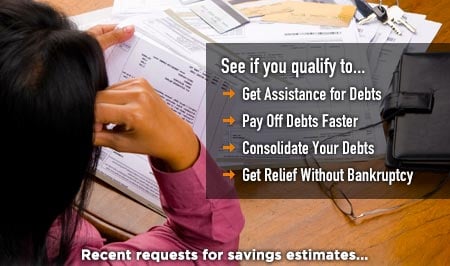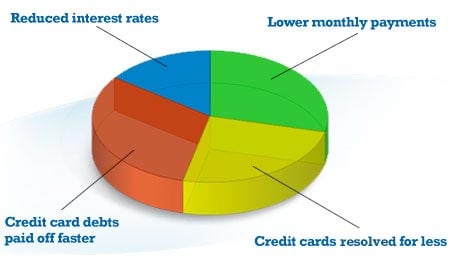
Debt Counseling
If your credit card debts have spiraled out of control and you are now struggling to keep up with your monthly payments, you may be interested in finding out how much debt counseling or debt consolidation could potentially save you. Facilitated by credit counseling agencies, debt consolidation programs assist many consumers in Virginia and across the country to find relief from their high-interest credit card debts, as well as unsecured debts (like medical bills, utilities, student loans, department store charges), with a more structured and more manageable payment plan.
The goal is, with a more structured and more affordable repayment plan, you can, hopefully, direct more of your payment into paying the principal of your debts versus just the interest and reduce your debts at an accelerated pace.
Find out if you qualify for savings with a free debt relief analysis and savings estimate - by answering just a few, simple questions. Start here.
What to Expect With Debt Consolidation
For many consumers, rising credit card and unsecured debts are serious problems that won't just magically go away. And any number of reasons may cause debt - including a loss or reduction in income, medical bills, or a personal crisis. If you find yourself in financial distress, you know that debts often cause emotional and mental stress as well, and may even trigger unwanted tension among many families and individuals.
But you can breathe a little easier because as mentioned earlier, one of the ways that you can find debt relief is through a process known as debt consolidation, or a debt management plan (DMP).
The goal of a debt consolidation plan is to "consolidate," or combine, your credit card and unsecured debts into a single, more manageable and more structured monthly payment made to a credit counseling agency.
Coordinated by credit counselors, the debt consolidation process typically begins with a review of your income, outstanding debts, and other assets. This process generally entails taking stock of all your spending, debt amounts, and other expenses, as well as adding up the balances on your credit cards and the interest rates that you are currently paying.
Once credit counselors have a clear picture of your finances, they typically submit proposals to creditors, on your behalf, requesting lower interest rates and the waiving of late fees and penalties. Creditors that accept the proposals are added to the debt management plan. Credit counseling agencies, in turn, distribute those funds to creditors that are in the plan.
Will Debt Consolidation Lead to Savings?
For many consumers who have the discipline to watch their budget and stop relying on their credit cards for most of their purchases, a consolidation plan can be a form of debt relief that will likely help them get on a path towards reducing their debts and potentially lead to savings. Keep in mind, however, that while it is the credit counselor's responsibility to request from your creditors a more lenient repayment plan, it is your responsibility to ensure that you have the funds available in the account set up by the credit counseling agency.
In addition, make sure that you understand how much savings you can potentially get, every month, with a debt consolidation or management plan. Typically, your savings depend on several factors: the total amount of your debts, the current interest rates, and any late fees or penalties.
The bottom line is, if you are ready to tackle your credit card and unsecured debts, take the next step and find out what debt counseling and other debt relief programs can do for you and your family.
To explore your debt relief options, request free debt relief analysis and savings estimate.





















